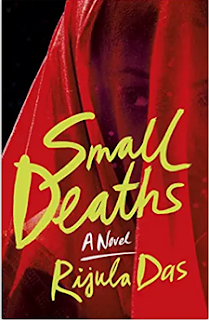Rijula Das is the author of the new novel Small Deaths. Her work has appeared in a variety of publications, including Papercuts. Also a Bengali-to-English translator, she lives in Wellington, New Zealand.
Q: What inspired you to write Small Deaths, and how did you create your character Lalee?
A: I wanted to write a novel about Kolkata, and explore issues of sexual violence and women’s agency in a culture that tries to squash it. I wanted to explore the story from the vantage point of a large cast of characters, and explore the repercussions of the crimes that we as a society let slip through the cracks.
Lalee’s character needed a lot of research into many women’s experiences in Shongachhi and their stories, but creating a fictional character is an exercise in blending reality with imagination.
Q: The Publishers Weekly review of the book says, in part, “Das effectively reveals a painful paradox: the exploited workers frequently consider the brothel their only home in a land that can ‘overwhelm one with kindness one minute and skin you alive the next.’ This devastating novel is in turn touching and painful to read.” What do you think of that description?
A: I felt that description captured one of the themes of Small Deaths, which is exploring what home means, what belonging means, and how we create homes for ourselves wherever we might find ourselves. It was also an exploration of how women build and live in a community, how the most marginalised and oppressed people exercise agency, dream, and create change for a better life.
Q: Did you know how the novel would end before you started writing it, or did you make many changes along the way?
A: I knew how the novel would end when I finished the first draft. I have extensively rewritten what is now Small Deaths many times before publication, especially after the demonetisation of 500 rupee currency notes changed the landscape of sex work in Kolkata.
But the ending of the novel has remained the same, even if the plot and pace of story has changed entirely between drafts. I think it’s the best thing about writing something as long as a novel; you get to feel your way forward.
Q: What do you hope readers take away from the story?
A: Small Deaths, to me, is a novel about dreams; about home and belonging and how we build communities; and about the deaths that we as a society let slip through the cracks. I hope readers are able to experience a slice of life in Kolkata and Shonagachhi through the book, and that the ideas of women’s agency in the face of gendered violence and oppression will resonate with readers.
Q: What are you working on now?
A: I’m currently finishing translating a novel from Bengali to English, soon to be published by Seagull Books, and hoping to start work on my next novel soon.
Q: Anything else we should know?
A: Small Deaths will come out in Russian and French translations. As a translator myself, I find it quite exciting. It is also in development as a limited series which I am looking forward to.
--Interview with Deborah Kalb


No comments:
Post a Comment